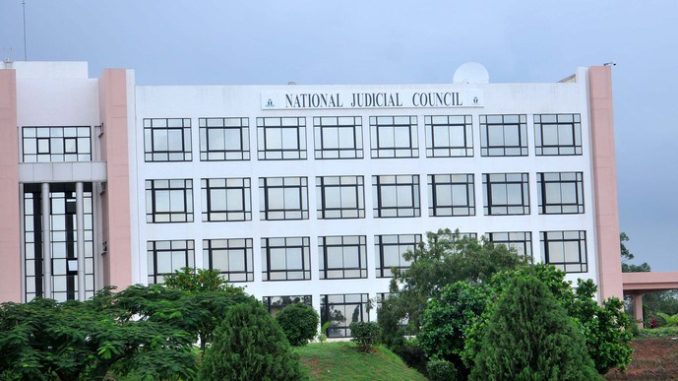
The National Judicial Council did not object to the Economic and Financial Crimes Commission’s prosecution of allegedly corrupt judges, a correspondence between the Council and the anti-graft agency obtained by PREMIUM TIMES has shown.
In a July 24, 2017 letter to the Commission, the NJC, the body saddled with disciplining erring judges, acknowledged being aware that some judges suspected of corruption were being investigated by the anti-graft body, with charges already filed against a number of them.
As a mark of support for the investigation/prosecution of the judicial officials, the NJC told the EFCC that its leadership had decided that the affected judges should cease to perform judicial duties pending the conclusion of the cases involving them.
The council further stated that on June 1, 2017, it took a decision that judicial officers against whom charges had not been filed be cleared to resume their duties pending when they are charged.
In the correspondence with the EFCC, the NJC noted that under its rules, disciplinary actions could only be commenced against a judicial officer upon receipt of a petition against such a judicial officer, adding that it had not received any against the judges in question.
The NJC however permitted the anti-graft agency to proceed with the instant cases it was already handling, saying it had suspended those who had already been charged.
But it advised the anti-graft agency, to, in future, send petitions against judicial officers in respect of any matter of misconduct or corruption to enable it take appropriate disciplinary action.
“The EFCC will be at liberty thereafter to take appropriate legal action against such judicial officers,” read the NJC letter signed by its Secretary, Ahmed Gambo Saleh.
“It is important to note that the threshold of proof of misconduct before the National Judicial Council Disciplinary Committee is much lower than the threshold of proof of criminal conduct. The Council may, therefore, be in position to discipline any erring judicial officer even where such conduct may not be criminal in nature.
On Monday, the Lagos Division of the Court of Appeal ruled that the EFCC lacks the statutory powers to investigate or prosecute serving judicial officers except where such individuals have first been dismissed or retired by the NJC.
According to the appellate court, serving judicial officers can only be prosecuted for offences like theft, fraud, murder or manslaughter, arson and the likes which are crimes committed the scope of judicial functions. But once the offence was allegedly committed in the discharge of their duties, they must first be tried by the NJC and dismissed or retired before the EFCC can investigate or prosecute them, the court said.
The appellate court’s decision was in respect of a suit instituted by the EFCC against Hyeladzira Nganjiwa, a judge of the Bayelsa Division of the Federal High Court, who was accused of unlawfully receiving $260,000 and N8.6 million, monies that were beyond his emoluments as a judicial officer, between 2013 and 2015.
“I need to emphasize that the Constitution of this country, being the grund norm, and fundamental legal order of the state clearly recognizes the doctrine of separation of powers and checks and balances,” said Abimbola Obaseki-Adejumo, who delivered the lead judgment.
“Sections 4, 5 and 6 thereof contains provisions relating to the legislative, executive and judicial arms of the government.
“In most known democracy, the judiciary is always accorded the freedom to conduct its affairs without fear of interference, intimation (sic), threat, I’ll will from any other arm of government.”
The EFCC’s response to the ruling was a furious 120-word statement describing the decision as “ridiculous” and a “dangerous precedent.”
The EFCC’s response to the ruling was a furious 120-word statement describing the decision as “ridiculous” and a “dangerous precedent.”
Mr. Nganjiwa was arraigned last June by the EFCC on a 14-count charge of corrupt enrichment and giving false information to an EFCC officer.
His arraignment came barely one week after he and five other judges were recalled by the NJC after they had earlier been suspended in November 2016 following corruption allegations against them.


![Walter-Onnoghen Chief Justice of Nigeria, Walter Onnoghen [Photo: Guardian Nigeria]](https://i0.wp.com/media.premiumtimesng.com/wp-content/files/2017/09/Walter-Onnoghen.jpg?zoom=1.6500000953674316&resize=600%2C338&ssl=1)



Be the first to comment